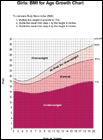
Overweight Children
Why are some children overweight?
There are more overweight children today than ever before. Many children eat too many calories from high fat foods, sweets, and large portion sizes. Another reason is lack of exercise. Children today get less exercise than ever before in history. Another cause of kids becoming overweight is genetics. Body shape and weight often run in the family. Children of overweight parents are more likely to be overweight as well.
Is my child overweight?
To find out if your child is overweight, your healthcare provider will check your child's height and weight against the standard growth charts. The body mass index, or BMI, for children is used for ages 2 through 20. These growth charts, one for boys and one for girls, are designed to check weight through the growing years. Your child's BMI is compared with that of thousands of children of the same age. Many body types are considered normal and there’s a wide range of healthy weights based on age and height. Overweight is greater than the 85% of BMI for your child's age.
What is the problem with being overweight?
An overweight child has a greater risk of health problems including:
- diabetes
- high cholesterol
- high blood pressure
- gallbladder disease
- sleep disorders
- asthma.
A child who is obese (greater than 95% of BMI for your child's age) is at very high risk for health problems.
Being overweight can also cause your child to be self conscious about his looks or be teased or bullied. Overweight children are at increased risk for depression and substance abuse. Sometimes the pressure from parents and other adults to lose weight causes children to react too strongly. They may think too much about weight and set the stage for an eating disorder.
Another problem is that overweight children often become overweight adults. Studies show that at least half of overweight children stay overweight through adulthood. Most overweight teens will also be overweight adults.
How do I help my child?
Parents often do not think that their child is overweight. Even if they know their child is heavier than other children, parents may think that the child will simply grow out of it. However, if a child is overweight, it is often due to unhealthy eating and exercise habits. Those habits are not likely to change unless parents take action.
Work with your child to follow a healthier lifestyle. Parents have much control and influence over their children's habits and eating patterns as they grow. If you provide your family with healthy foods and engage in regular physical activity, your kids will learn these healthy habits.
Some tips to help your child:
- Use the Choose My Plate style of eating to help control portion sizes. See http://www.choosemyplate.gov/ for details.
- Support and encourage your child. Children know when they are overweight and don't want to be nagged about it, especially at home.
- Make sure your child eats a healthy breakfast every day. Skipping breakfast can leave your child hungry, tired, and looking for less healthy foods later in the day.
- Eat meals together as a family, at the table when possible.
- Encourage everyone to eat slowly and enjoy the conversation as well as the food.
- If the family eats quickly, try salad with low-fat dressing and homemade vegetable soups as appetizers to help curb hunger and gobbling of food.
- Limit eating out at restaurants, especially fast food or those that serve large portions.
- Let your children help plan meals and shop for groceries. Show them how to read a nutrition label. This helps them learn and make their own decisions about new foods to try. Buy and serve more fruits and vegetables and fewer soft drinks and snack foods.
- Serve water and non-fat milk instead of sugary drinks.Keep healthy snacks on hand. Snacks like chips, cookies, and candy are high in fat and calories.
- Don't use food as a reward or withhold food as punishment. Children should not be put on a strict diet unless under the care of a healthcare provider or dietitian for medical reasons. A diet that is too strict can interfere with normal growth.
- Serve higher fiber meals. Serve more whole grains, fresh fruits, non-starchy vegetables and less processed food. Vegetables and fruits should make up one-half of your child’s plate. Beans are a good substitute for a diet too high in breads.
- Plan activities that include exercise, such as skating, biking, running, or walking. Kids need a total of about 60 minutes of physical activity a day, but this does not have to be all at one time. Short 5 to 10 minute bouts of activity throughout the day are just as good. If your children are not used to being active, encourage them to start with what they can do and build up to 60 minutes a day.
- Give your child active chores, such as washing the car, vacuuming, or cleaning windows.
- Set strict limits on TV time. Children who watch more than 2 hours of television a day are much more likely to be overweight.
- Most children like learning on the computer. Although too much computer time is not good, you will find there are kid friendly web sites and programs that provide fun ideas to get your kids moving and eating healthier. Send them to http://www.bam.gov/ to get started.
These tips can help prevent children from gaining too much weight, as well as helping them to lose weight in a healthy way.
If your child is still gaining weight after making changes in diet and exercise, your provider may want to check other possible reasons for your child being overweight.



